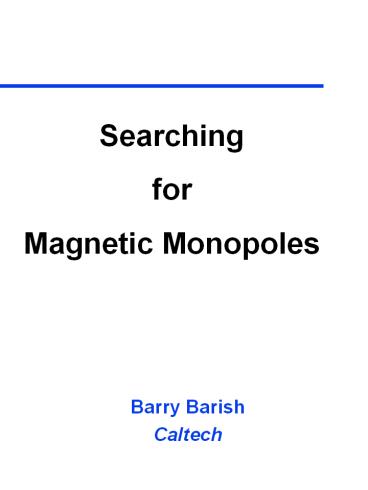Searching for Magnetic Monopoles
Title:
Searching for Magnetic Monopoles
Description:
Ampere, in 1820, asserted that all magnetism is due to electric currents [and, ... Ampere postulated magnets as solenoids, following Oersted's discovery that ... –
Number of Views:577
Avg rating:3.0/5.0
Title: Searching for Magnetic Monopoles
1
Searching for Magnetic Monopoles
- Barry Barish
- Caltech
2
Magnets in Natureancient history
- in this stone you should thoroughly
comprehend there are two points of which one is
called the North, the remaining one the South. - --- Petrus Peregrinus (1269 AD)
3
Magnetic Monopoleshistory
- Coulomb, in 1788, established inverse square
force law for both electric charges and magnetic
poles - Single Electric Charge
4
Magnet Monopoleshistory
- Ampere for multiple charges -
- electric dipole
- bar magnet
5
Magnetic Monopoleshistory
- Ampere, in 1820, asserted that all magnetism is
due to electric currents and, responding to
criticism of Faraday, invents microscopic
currents - loop of wire
6
Magnetic Monopoleshistory
- Ampere postulated magnets as solenoids, following
Oersteds discovery that electric currents
deflect compass needle - Solenoid - field like bar magnet
7
Magnetic Monopoleshistory
- By this point, the connection between electricity
and magnetism is becoming evident, but what is
magnetic analog of single electric charge?? - are there single magnetic poles?
8
Magnetic Monopolesmodern history
- Maxwell, in 1873, makes the connection between
electricity and magnetism - introducing magnetic monopole makes equations
symmetric
Magnetic monopole terms
9
Maxwells equationsconsequences
- making music electronically
- recording music
10
Maxwell Equations electromagnetic waves
- electromagnetic waves
- spectrum of em waves
11
Magnetic Monopolesquantization of charge
- Electric charge always comes in discrete values a
multiple of the charge of the electron - Dirac, in 1931, made connection of isolated poles
and quantization of electric charge - The first strong scientific motivation for
magnetic monopoles. - It inspired a large variety of imaginative
experiments.
12
Dirac Monopolesaccelerator searches
- direct detection (immediately after production
in high-energy collisions) - thin plastic sheets surround interaction regions.
- indirect searches (where monopoles are searched
for a long time after their production) - dump beam into ferromagnetic materials. Later
put in 200 Kgauss pulsed magnetic field to pull
monopoles out
Fermilab proton-antiproton collider
13
Dirac Monopolesmore experiments
- Cosmic Rays
- Price reported event from 18 m2 plastic detector
in 1975. Later excluded by Alvarez. Then they
published an upper limit. - Moon Rocks
- One of the first scientific experiments with moon
rocks was to search for a concentration of
magnetic monopoles by Alvarez.
14
Magnetic MonopolesGrand Unified Theories
- t Hooft and Polyakov (1974) discovered that
monopoles are fundamental solutions to
non-Ablelian gauge theories - may be primordial monopoles present in the
Universe - GUT monopoles are superheavy, and therefore, not
producable from particle accelerators - Search for GUT monopoles as rare non relativistic
particles in the cosmic rays
15
Grand Unificationenergy scale
- SU(3), SU(2), U(1) couplings converge at energy
scale 1015 GeV - not quite (e.g. needs supersymmetry or ??)
- Unification scale appears to be well below Planck
mass, where quantum gravity effects O(1)
16
GUT MonopoleStructure
- grand unification core
- virtual X-bosons (10-29 cm)
- electroweak unification
- virtual W, Z, g, g (10-16 cm)
- confinement region
- g, g (10-13 cm)
- condensate
- fermion-antifermion pairs (r mf-1)
17
GUT Monopolesflux vs b
- escape velocity b
- earth b 3.7 10-5
- solar system b 10-4
- galaxy b 10-3
- cluster of galaxies b 3 10-3
local
galactic
extragalactic
ln Nm
10-5 10-4 10-3 10-2 10-1
18
Monopole Abundanceearly universe
- GUTS standard cosmology leads to glut of
monopoles - for a monopole mass 1016 GeV
- taking Hubble constant (1010 yr)-1
- The Monopole Problem !!!!!!
19
Monopole Abundanceinflationary scenario
- idea
- defer the phase transition to much later, after
extreme supercooling - solves monopole problem
- also, resolves horizon and flatness problems
- In the simplest version, the number of monopoles
is very small - however, not SU(5) and the calculated flux
depends critically on several parameters (mass of
GUT monopole, temperature to which the universe
reheats, etc) - conclusion
- no guidance from cosmology about monopole flux --
could be a glut or a famine
20
Monopole Fluxastrophysical bounds
- mass density of the universe
- uniformly distribution (nM lt 2 10-21 cm-3)
- clumped distribution (nM lt 10-16 cm-3)
- galactic magnetic field
- B 3 10-6 gauss
- Parker limit - too many monopoles would short
out this field
21
Magnetic Monopolesconclusions
- Theory/Motivation
- Charge Quantization has been primary motivation
for magnetic monopole (Dirac) - Grand Unification - superheavy monopoles are
intrinsic to theory - Could be contributor to dark matter of the
Universe - Experiment
- NO evidence for Dirac Monoples from accelerator
searches, etc - NO evidence for Grand Unified Monopoles at level
of Astrophysics bounds ( 10-15 cm-2 sr-1 s-1 ) - Present searches (eg. MACRO) will probe factor of
10-20 below bound































